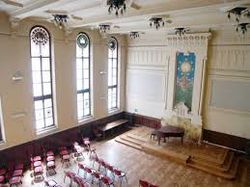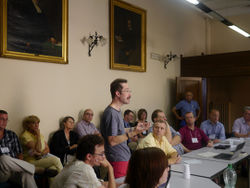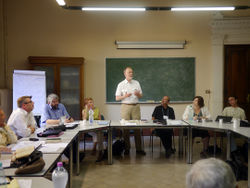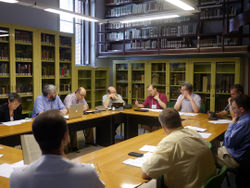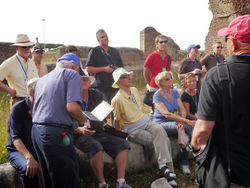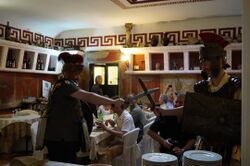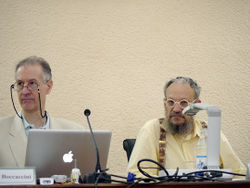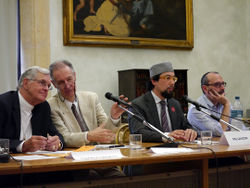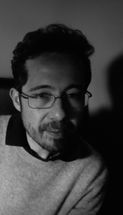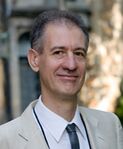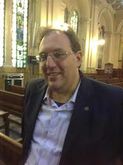Re-Reading Paul as a Second-Temple Jewish Author / 3rd Nangeroni Meeting (2014 Rome), conference
Re-Reading Paul as a Second-Temple Jewish Author (2014) is the topic of the third conference in the series of Nangeroni Meetings organised by the Enoch Seminar in Rome, Italy (June 22–26, 2014).
< 1st (Milan 2012) -- 2nd (Israel 2014) -- 3rd (Rome 2014) -- 4th (Milan 2015) -- 5th (Naples 2015) -- 6th (Camaldoli 2016) -- 7th (Rome 2016) -- 8th (Florence 2017) -- 9th (Milan 2018) -- 10th (Rome 2018) >
Third Nangeroni Meeting (Rome, Italy; June 22-26, 2014)
Chair: Carlos A. Segovia
Co-Chairs: Gabriele Boccaccini and Eric Noffke
in collaboration with the Waldensian Faculty of Theology
Secretary: Jason M. Zurawski
Preliminary Information
When: June 22-26, 2014
Accommodations: Casa Valdese (Rome, Italy)
Location of Seminar: Waldensian Faculty of Theology
Purpose: The meeting aims at re-examining afresh Paul’s Jewish background, his criticism against the Roman Imperial order, and his contribution to early Christian identity formation. We plan to have panels on the following topics: (1) Paul within Second Temple Judaism , (2) Paul and Second-Temple Jewish Apocalypticism , (3) Paul and Second-Temple Jewish Messianism , (4) Paul and the Law , (5) Paul between Empire and Jewish Identity , (6) Is There a ‘Two-Way Salvation’ in Paul? , (7) Paul, Anti-Semitism, and Early Christian Identity Making .
Major papers will be offered by Gabriele Boccaccini, William Campbell, James Charlesworth, Pamela Eisenbaum, Larry Hurtado, Mark Nanos, David Rudolph, and James Waddell. Short papers on any of the aforementioned general topics will also be welcome. The pre-circulating papers shall be presented briefly (5 min.) before being discussed by the participants.
Paper Submission: They should be submitted by April 30, 2014. This will allow respondents and other participants enough time to prepare their responses.
Proceedings: A volume will be published with the proceedings of the conference, which overall purpose is to contribute to the contemporary re-reading of Paul as a Jewish author by analysing some of the most controversial issues currently addressed in Pauline scholarship in close dialogue with Second Temple studies.
Please contact the secretary of the Enoch Seminar, Jason Zurawski (jasonzur@umich.edu), for further information.
Accommodations
We have secured the lovely Casa Valdese on Via Farnese, right in the heart of Rome, for our accommodations (and the Convitto at the Waldensian Faculty for overflow). Four nights lodging and all breakfasts and lunches are included in the cost, paid directly to us in Rome via cash:
- €0 – Authors of Major Papers
- €200 – Major Paper Respondents
- €300 – Everyone else
- €200 – Guests (children under 14, staying in the same room, are free)
Registration
Participation in the Third Nangeroni Meeting is by invitation only. If you have already secured your participation, please fill out the official online registration form and pay your registration fee by February 15, 2014.
Participants
- Baumgarten, Albert (Bar-Ilan University, Israel)*
- Bazzana, Giovanni (Harvard University, USA)*
- Boccaccini, Gabriele (University of Michigan, USA)*
- Boyarin, Daniel (University of California Berkeley, USA)*
- Campbell, William (University of Wales Trinity Saint David, UK, EU)*
- Charlesworth, James (Princeton Theological Seminary, NJ, USA)*
- Cosentino, Augusto (Independent Researcher, Italy, EU)*
- deSilva, David (Ashland University, USA)*
- Ehrensperger, Kathy (University of Wales Trinity Saint David, UK, EU)*
- Eisenbaum, Pamela (Iliff School of Theology, Denver, CO, USA)*
- Fredriksen, Paula (Hebrew University of Jerusalem, Israel)*
- Garroway, Joshua (Hebrew Union College, California, USA)*
- Goff, Matthew (Florida State University, USA)*
- González, Eusebio (Pontificial University of the Holy Cross, Rome, Italy, EU)*
- Hurtado, Larry (University of Edinburgh, Scotland, UK)*
- Jackson, David (William Carey Christian School, Australia)*
- Johnson Hodge, Caroline (College of the Holy Cross, Worcester, MA, USA)
- Ludlow, Jared (Brigham Young University, Utah, USA)*
- Nanos, Mark (Rockhurst University, Kansas City, MO, USA)*
- Noffke, Eric (Waldensian Faculty of Theology, Rome, Italy, EU)
- Oegema, Gerbern (MgGill University, Montreal, QC, Canada)*
- Oliver, Isaac (Bradley University, Peoria, IL, USA)*
- Ossandón, Juan Carlos (Pontificial University of the Holy Cross, Rome, Italy, EU)*
- Paladino, Laura (European University of Rome, Italy, EU)
- Petersen, Anders Klostergaard (University of Aarhus, Denmark, EU)*
- Piñero, Antonio (Complutense University of Madrid, Spain, EU)*
- Punt, Jeremy (Stellenbosch University, South Africa)*
- Rudolph, David (Messianic Jewish Theological Institute, Los Angeles, CA, USA)*
- Sailors, Timothy (Eberhard Karls University of Tübingen, Germany, EU)*
- Satlow, Michael (Brown University, Providence, RI, USA)*
- Segovia, Carlos (Saint Louis University, Madrid, Spain, EU)*
- Sheinfeld, Shayna (McGill University, Montreal, QC, Canada)*
- Wan, Sze-kar (Southern Methodist University, Dallas, USA)*
- Zetterholm, Magnus (University of Lund, Sweden, EU)*
- Zurawski, Jason (University of Michigan, USA)*
Schedule
Sunday, June 22
8:00-15:00 -- Arrivals
17:00 -- Opening Session & Welcome (Hotel Casa Valdese)
17:45–19:30 -- Session 1: RE-IMAGINING PAUL AS A SECOND-TEMPLE JEW (Hotel Casa Valdese)
- Gabriele Boccaccini, "The Three Ways of Salvation of Paul the Jew"; Respondent Albert I. Baumgarten
20:00 -- Dinner (Hotel Casa Valdese)
Monday, June 23
8:00 -- Breakfast
9:00–10:15 -- Reading Sessions (Waldensian Faculty of Theology)
- (a) Philippians 2:6-11 on Apocalypticism/Messianism (Aula A)
- Chair Paula Fredriksen
- (b) 1 Thessalonians 4:13—5:10 on Apocalypticism/Messianism (Aula B)
- Chair Eric Noffke
10:45-12:30 -- Session 2: PAUL AND SECOND-TEMPLE JEWISH APOCALYPTICISM (Waldensian Faculty of Theology, Aula A)
- James H. Charlesworth, "Paul and apocalypticism: A re-examination of 2 Corinthians and 2 Enoch"; Respondent Michael Satlow
12:45 - Lunch (Hotel Casa Valdese)
14:15–16:00 -- Session 3: PAUL AND SECOND-TEMPLE JEWISH MESSIANISM (Waldensian Faculty of Theology, Aula A)
- Larry W. Hurtado, "Jesus' Messianic Status in Pauline Christology"; Respondent Paula Fredriksen
16:45-18:15 -- Short papers (Waldensian Faculty of Theology)
- (a) Paul and Scripture / Paul in Scripture (Chair: Jeremy Punt), (Aula A)
- Gerbern S. Oegema, "The Reception of 1 and 2 Maccabees in the Letters of Paul"
- Isaac W. Oliver, "The Historical Paul and the Paul of Acts: Who's More Jewish?"
- Michael Satlow, "Paul's Scriptures"
- Shayna Sheinfeld, "Who Is the Righteous Remnant in Romans 9–11? The Concept of Remnant from the Hebrew Bible, Early Jewish Literature, and Paul’s Letter to the Romans”
- (b) Paul and the Apocalyptic Imagination (Chair: Jason M. Zurawski), (Aula B)
- Kathy Ehrensperger, "The Pauline Ekklesiai and Images of Community in Enochic Tradition in Bi-cultural Perspective"
- Matthew Goff, "Heavenly Mysteries and Otherworldly Journeys: 1 and 2 Corinthians in the Context of Jewish Apocalypticism"
- Juan Carlos Ossandón, "Romans 2:14-15 and 4 Ezra: Do They Have in the Background the Identification between Torah and Wisdom (Sir 24)?"
- David Arthur DeSilva, "Grace, the Law, and Justification in 4 Ezra and the Pauline Letters: A Dialogue"
Tuesday, June 24
8:00 -- Breakfast
8:45-10:15 -- Short papers (Waldensian Faculty of Theology)
- (a) Revisiting Paul's Theology, Eschatology, and Cultural Background (Chair: Timothy Sailors), (Aula A)
- Jared W. Ludlow, "Is Paul’s Notion of God’s Foreknowledge Consistent with Second Temple Jewish Thought?"
- Anders Klostergaard Petersen, "Paul the Jew Was also Paul the Hellenist"
- Antonio Piñero, "The Law of Moses and Paul: Does the Law of Moses Change in Messianic Times?"
- (b) Paul, Ethnicity, and Identity Construction (Chair: Shayna Sheinfeld), (Aula B)
- Paula Fredriksen, "Why Should a 'Law-free' Mission Mean a 'Law-free' Apostle?"
- Jeremy Punt, "Paul's Jewish Identity in the Roman World: Beyond the Conflict Model"
- Carlos A. Segovia, "Discussing/Subverting Paul: Polemical Rereadings and Competing Supersessionist Misreadings of Pauline Inclusivism in Late Antiquity – A Case Study on the Apocalypse of Abraham, Justin Martyr, and the Qur’ān"
- Sze-kar Wan, "'To the Jew First and Also to the Greek': Paul’s Letter to the Romans as Ethnic Construction”
10:45-12:30 -- Session 4: PAUL AND THE LAW (Waldensian Faculty of Theology, Aula A)
- David J. Rudolph, "Paul and the Food Laws: A Reassessment of Romans 14:13-23"; Respondent Albert I. Baumgarten
- Mark D. Nanos, "Qualifying Paul's Position on Circumcision in Dialogue with Josephus's Advisors to King Izates"; Respondent Kathy Ehrensperger
12:40 -- Lunch (Hotel Casa Valdese)
13:30 -- Leave for Ostia Antica, from Hotel Casa Valdese (Pauline itinerary: Visit of St. Paul Outside the Walls and Ostia Antica. Dinner at Ostia)
22:30 -- Return from Ostia Antica
Wednesday, June 25
8:00 -- Breakfast
9:00–10:15 -- Reading Sessions (Waldensian Faculty of Theology)
- (a) Galatians on Torah (Aula A)
- Chair Mark D. Nanos
- (b) Romans on Torah (Aula B)
- Chair Magnus Zetterholm
10:45-12:30 -- Session 5: PAUL BETWEEN EMPIRE AND JEWISH IDENTITY (Waldensian Faculty of Theology, Aula A)
- Joshua Garroway, "Engendering Judaism: Paul, Baptism, and Circumcision"; Respondent Sze-kar Wan
12:45 -- Lunch (Hotel Casa Valdese)
14:30–16:15 -- Session 6 – IS THERE A 'TWO-WAY SALVATION' IN PAUL? (Waldensian Faculty of Theology, Aula A)
- Pamela Michelle Eisenbaum, "Gentiles as a Cultic Category in Paul"; Respondent Magnus Zetterholm
17:00 -- Leave for Gregoriana
18:00-20:00 - Card. Bea Center for Judaic Studies, Pontifical Gregorian University
"Paul the Jew" (Daniel Boyarin) Respondents: Romano Penna, Piero Stefani, Gabriele Boccaccini. Chair: Philipp Renczes, Director, Card. Bea Centre for Judaic Studies
Thursday, June 26
8:00 -- Breakfast
9:00–10:45 -- Session 7: PAUL, ANTI-SEMITISM, AND EARLY CHRISTIAN IDENTITY MAKING (Waldensian Faculty of Theology, Aula A)
- William Campbell, "Paul, Anti-Semitism, and Early Christian Identity Making"; Respondent Caroline Johnson Hodge
11:15–12:30 -- Closing Plenary Session (Waldensian Faculty of Theology, Aula A)
12:45 -– Lunch & Farewells (Hotel Casa Valdese)
16:00-19 -- "Vocazione, conversione, cittadinanza, e liberta' religiosa" -- Additional lecture at the Campidoglio, hosted by the City of Rome and the Mayor (Sala Pietro da Cortona, Musei Capitolini)
- James H. Charlesworth (Princeton Theological Seminary)
- Rav Carucci Viterbi (Jewish Community of Rome)
- Imam Yahya Pallavicini (Muslim Community of Rome)
- Prof. Silvio Ferrari (University of Milan)
- Chair: Gabriele Boccaccini (University of Michigan)
"Paul the Jew" - Online Forum at the Enoch Seminar Website
In preparation to the meeting, an online forum has recently been opened at the Enoch Seminar Website to give all prospective participants and other specialists in the field the opportunity to share their views on some of the topics that will be addressed during the conference. The Forum can be accessed here: Online Forum at the Enoch Seminar Website. The format is that of a collective interview based on 8 major questions; all participants in the forum are invited to give a 150-200-word reply to each question. Answers shall be emailed to the secretary of the Enoch Seminar, Jason Zurawski (jasonzur@umich.edu), at the earliest convenience (if possible, before December 31, 2013).
Questions:
- (1) A PARADIGM SHIFT IN PAULINE STUDIES? Pauline studies have undergone major changes in recent times. Which new research topics and methods would you especially highlight? Would you, moreover, agree to speak of a paradigm shift?
- (2) PAUL’S “CONVERSION.” Paul and the author of Acts describe Paul’s “conversion” on the way to Damascus. How should this experience be understood?
- (3) PAUL & ISRAEL. Which was Paul’s concern for Israel and his chief contribution to Second Temple Judaism? How and to what extent do novelty and tradition merge in his own thought-world?
- (4) PAUL’S CONSISTENCY. May Paul have used different cultural-based conceptual registers to frame his message? Could this help us to properly distinguish between his core ideas and their provisional, multi-faceted and often fragmentary presentations? Could it also help us to better understand his apparent contradictions?
- (5) JUSTIFICATION & SALVATION. Are the terms “justification” and “salvation” interchangeable in Paul? What precise relation can be traced between them? How historically accurate is the Lutheran view of Paul as the champion of “salvation by faith”?
- (6) PAUL’S OPPONENTS. Who were Paul’s opponents within and outside the Jesus movement? Could a renewed identification of these shed new light upon the intent, meaning, and limits of some of his apparently ambivalent, controversial statements about the Mosaic law?
- (7) PAUL & EMPIRE. What connections and eventual oppositions are there between Paul’s message and the semiotics of Roman imperial order? Why have scholars been so traditionally reluctant to take them into account and explore them systematically?
- (8) PAUL & EARLY CHRISTIANITY. How did early Christians from the late 1st century onwards reinterpret and reuse Paul's message to the nations? Was early Christianity truly Pauline? Or was his message not just reshaped but also somehow subverted by the early Church?
Facilities & Accommodations
The sessions of the Enoch Seminar will take place at the:
Biblioteca Facolta Teologica Valdese
Via Pietro Cossa, 42
Rome, Italy
+39 06 320 4768
The primary accommodations will be at:
Hotel Casa Valdese
Via Alessandro Farnese, 18
00192 Rome, Italy
+39 06 321 5362
casavaldeseroma.it
We will also have people staying at the Convitto of the Waldensian Faculty (the site of the conference).
Getting to the Site
From Rome Fiumicino Airport
- Take train to Termini Station
- From Termini, take the subway (Linea A, the red one) in the direction of "Battistini." Get off at "Lepanto," the 5th stop from Termini.
- The Hotel Casa Valdese (Via Alessandro Farnese 18) is a two minute walk from Lepanto station. See the map.
- Tickets for the train and the subway can be purchased at Fiumicino. Total cost is about 17 euros.
- Instead of taking the subway, you can also take a taxi from Termini. The cost should be around 25 euros.
- You can also take a taxi from the airport directly to the Hotel. The cost is around 50 euros. Be aware of private taxis. Only use the white taxis which are parked at the taxi stand outside.
- There is also a shuttle service at the airport, direct to the hotel, the cost is about €25 for a single. They offer a return service discount of 20%. For a car shuttle it is €35. They are autonoleggio con conducente (Con.co.r.a) at www.concora.it, concora@gmail.com, Tel 39 066507266
- The cheapest method from Fiumicino is a bus to Lepanto station, but it takes at least an hour.
Walking directions from Hotel Casa Valdese to the Waldensian Faculty
